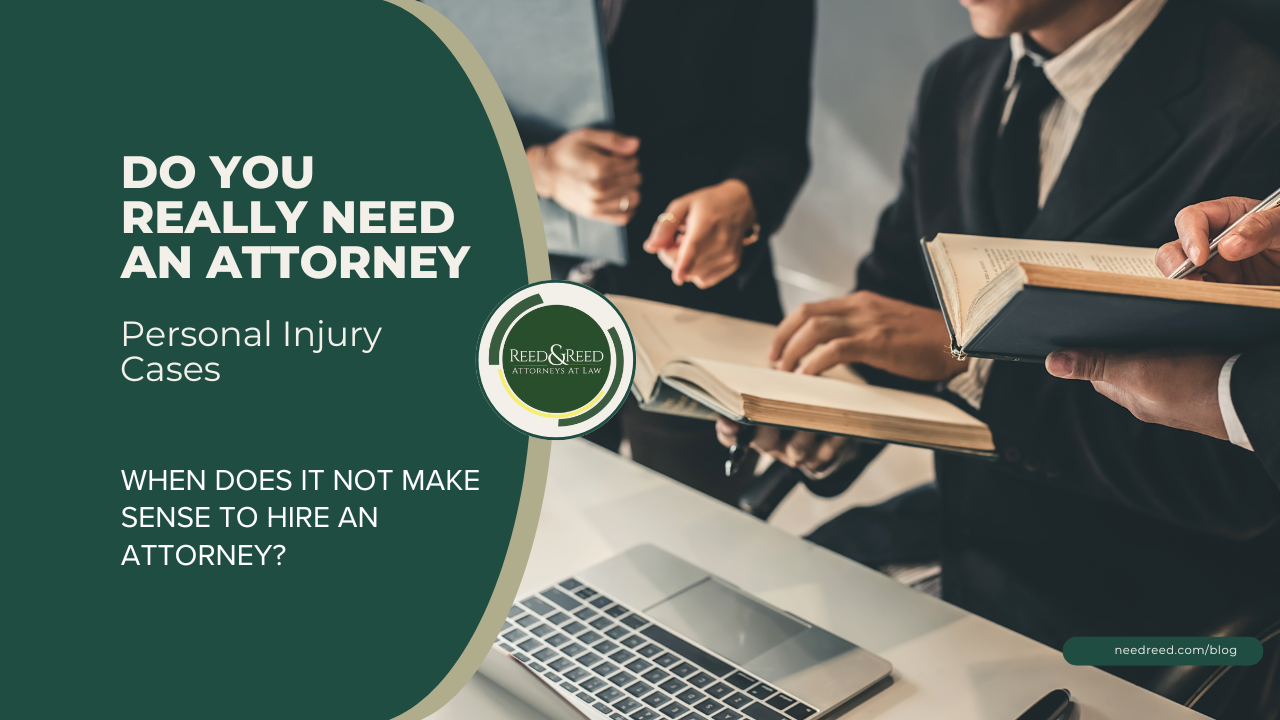If the negligent or wrongful conduct of another party caused or contributed to injuries you suffered in a personal injury accident, you could be entitled to compensation from the at-fault party. Do you need a lawyer, however, to pursue compensation in a personal injury accident? How do you know if you need to hire a lawyer following a car accident or another type of personal injury accident? Attorney Paul Reed answers these and other commonly asked questions on a recent episode of Lawyer Podcast.
Why Should I Hire a Lawyer?
If you are injured in a motor vehicle accident, and you were not at fault, you will likely get a phone call from the at-fault party’s insurance company shortly after the accident. The same applies if you were injured in a slip and fall accident at a business, an amusement park accident, or any other personal injury accident for which liability insurance coverage applies. The insurance company may even offer you money for your injuries, leading you to wonder why you should hire an attorney and pay them one-third of the money you receive. Attorney Paul Reed offers several examples that illustrate the considerable benefits that come with hiring a lawyer for a personal injury accident.
Listen to Paul and Jason discuss this case on the LiveFeedReed podcast

In the first example, his client suffered catastrophic injuries in a head-on collision in which the other driver was intoxicated at the time of the collision. The victim had hundreds of thousands of dollars in medical bills alone before factoring in pain and suffering; however, the at-fault driver only had $50,000 in insurance coverage. Not surprisingly, the at-fault driver’s insurance company offered to pay the victim the full $50,000, but that would not even cover the medical bills. Attorney Reed’s office got involved and conducted a thorough investigation of the at-fault driver, discovering that he owned a business. Moreover, that investigation was able to tie the at-fault driver’s intoxication to a business function, making the at-fault driver’s business insurance policy liable for the victim’s injuries. The business insurance policy limit was $750,000 which was ultimately what the victim received. Yes, the victim did pay one-third of that to an attorney; however, she ended up with 10 times the compensation that she would have received without an attorney.
In another example, a young kid was driving a vehicle in the middle of the night and killed someone in a car accident. The owner of the vehicle only had the state minimum of $10,000 in liability insurance. The decedent’s estate filed a claim against the policy and the insurance company refused to pay the $10,000 because they claimed there was an issue over whether the driver had permission to drive the vehicle. Ultimately, the estate sued the insurance company claiming they acted in bad faith and won a $7 million judgement against the insurance company. The average person would not be expected to understand what constitutes “bad faith” on the part of an insurance company but because an attorney does the victim’s estate received a settlement worth thousands of times more than what they even expected to receive.
Sometimes, the decision to hire an attorney can make the difference between compensation and walking away with nothing. For example, did you know that you are not required to give a recorded statement to the at-fault driver’s insurance company following an accident? Most people don’t know that. An insurance adjuster calls and ever so nicely explains that they know you aren’t at fault, they just need a statement so they can “get the facts” down for their records. They are very good at their jobs. They intentionally call as soon after the accident as possible – often before you realize the extent of your injuries. They are counting on you saying something that will preclude liability on their part or at least diminish the value of your claim. Attorney Paul Reed does not allow clients to give recorded statements for this reason, therefore preserving their right to collect maximum compensation for all their injuries.
When Does It Not Make Sense to Hire an Attorney?
While there are often significant benefits to hiring a personal injury attorney, there are also situations where it does not make sense to do so. For example, if liability is clear and the only source of compensation is a liability insurance policy with a maximum of $10-25,000, paying a lawyer one-third of what you could collect without an attorney does not make sense. As attorney Reed explains, you may be able to get a judgment against the at-fault driver for more than the policy limit; however, they may be able to file for bankruptcy protection and you won’t receive a penny more than the policy limit at the end of the day.
Likewise, if you were injured by medical malpractice, the cost of pursuing a claim against the at-fault parties may outweigh the potential settlement or award for damages. Medical malpractice cases are extremely complicated to litigate, typically taking three to four years to get to trial and averaging $100,000 in expenses. Unless you suffered catastrophic injuries as a result of medical malpractice, you likely do not have a viable medical malpractice case.
If you have questions or concerns about a personal injury lawsuit, contact the experienced personal injury attorneys at Reed & Reed.
